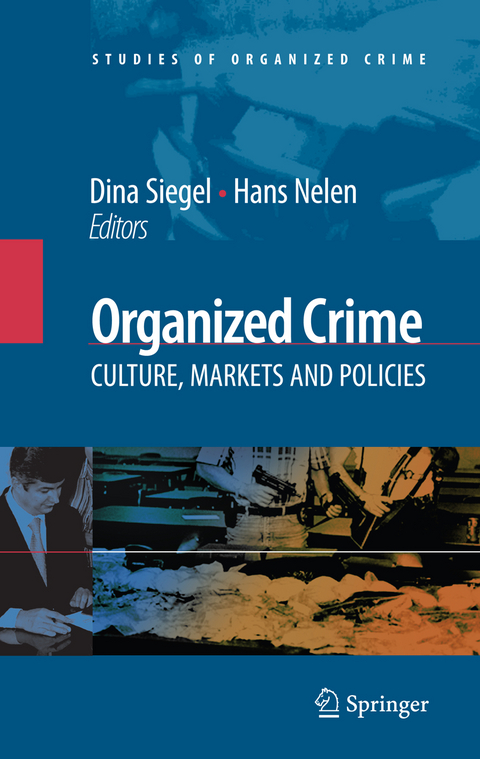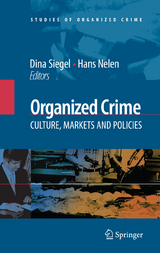Organized Crime: Culture, Markets and Policies
Springer-Verlag New York Inc.
978-0-387-74732-3 (ISBN)
Dina Siegel is an Assistant Professor at the Department of Criminology and Criminal Law, Vrije Universiteit Amsterdam. She studied sociology and social anthropology at Tel Aviv University in Israel and obtained her PhD in cultural anthropology at the Vrije Universiteit of Amsterdam, the Netherlands. She has studied and published several articles on post-Soviet organized crime, terrorism, human trafficking, criminal activities in diamond sector, and on drug policies in the Netherlands. In 2003 she edited (together with Van de Bunt and Zaitch) Global Organized Crime. Trends and Developments (Kluwer Academic Publishers, 2004). She conducted ethnographic research on Russian-speaking criminals in the Netherlands, Russian biznes in the Netherlands (2005, Meulenhoff). Hans Nelen is a criminologist and has a law degree. Between 1986 and the beginning of 2001 he was employed as a senior researcher and research supervisor at the Research and Documentation Centre of the Ministry of Justice in the Netherlands (WODC), mainly investigating drug crime, fraud and corporate crim. Between 2001 and 2006 he was a senior lecturer and senior researcher at the Institute of Criminology of the Vrije Universiteit Amsterdam. Since January 1 2007 Nelen has been working as a Professor of Criminology at Maastricht University (UM). During the last decade Nelen published several books and articles on a variety of criminological subjects, i.e. corruption and fraud, dilemmas facing lawyers and notaries, the administrative approach to organized crime, the proceeds-of-crime approach, evaluation of legislation, and evaluation of law enforcement activities.
Criminal Groups and Activities.- Reflections on the Sicilian Mafia: Peripheries and Their Impact on Centres.- The Decline of the Italian Mafia.- Hashish Smuggling by Bedouin in South Sinai.- Corruption as a Causal Factor in Human Trafficking.- New Players in an Old Game: The Sex Market in Italy.- The Vehicle Theft Market in Bulgaria.- Diamonds and Organized Crime:The Case of Antwerp.- Eco-Crime: The Tropical Timber Trade.- The Role of Hawala Bankers in the Transfer of Proceeds from Organised Crime.- Facilitating Organized Crime: The Role of Lawyers and Notaries.- Law Enforcement.- Criminal Conflicts and Collective Violence: Biker-Related Account Settlements in Quebec, 1994–2001.- Controlling Human Smuggling in the Netherlands: How the Smuggling of Human Beings Was Transformed into a Serious Criminal Offence.- The Civil RICO Law as the Decisive Weapon in Combating Labour Racketeering.- Recent Anti-Mafi a Strategies: The Italian Experience.- Breaking the Power of Organized Crime? The Administrative Approach in Amsterdam.
| Erscheint lt. Verlag | 16.11.2007 |
|---|---|
| Reihe/Serie | Studies of Organized Crime ; 7 |
| Zusatzinfo | VIII, 230 p. |
| Verlagsort | New York, NY |
| Sprache | englisch |
| Maße | 155 x 235 mm |
| Themenwelt | Recht / Steuern ► Strafrecht ► Kriminologie |
| Sozialwissenschaften ► Politik / Verwaltung ► Politische Theorie | |
| ISBN-10 | 0-387-74732-X / 038774732X |
| ISBN-13 | 978-0-387-74732-3 / 9780387747323 |
| Zustand | Neuware |
| Haben Sie eine Frage zum Produkt? |
aus dem Bereich




